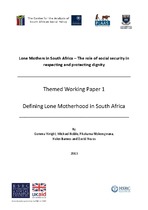Defining Lone Motherhood in South Africa
Date
2013Author
Wright, Gemma
Noble, Michael
Ntshongwana, Phakama
Barnes, Helen
Neves, David
Metadata
Show full item recordAbstract
The purpose of this document is to define the group of people whom we are considering as part of the project ‘Lone Mothers in South Africa: The role of social security in respecting and protecting dignity’. Setting to one side the group of interest briefly (‘lone mothers’), the project originates from research undertaken for the South African Department of Social Development (DSD) about attitudes to employment and social security (Noble et al., 2008; Ntshongwana and Wright, 2010a and 2010b; Ntshongwana et al., 2010; Surender et al., 2007; Surender et al., 2010). During the fieldwork for that programme of research, participants in focus groups repeatedly made the unprompted point that poverty eroded their sense of dignity. Given that the South African Constitution declares that people have inherent dignity and that dignity should be protected and respected (Republic of South Africa, 1996), we decided to dedicate a separate project to exploring the role that social security currently plays in relation to people’s sense of dignity. Specifically we hoped to explore whether social assistance, as a financial transfer to low income people, serves to help to protect and respect people’s dignity, or conversely whether there are ways in which the country’s social security arrangements serve to undermine people’s dignity.
Currently, there is no social assistance for low income people of working age, even though there is a commitment elsewhere in the Constitution to the progressive realisation of access to social assistance for people, and their dependants, who are unable to support themselves (Republic of South Africa, 1996: Chapter 2 section 27). We therefore wanted to additionally explore whether people thought that – in the context of very high levels of unemployment ‐ some additional form of social assistance might be a worthwhile poverty alleviation measure that would help to protect and respect people’s sense of dignity, or whether it might serve to further erode people’s sense of dignity.
Although the issues around poverty, dignity and social security could be explored with any subgroup of the population, we selected lone mothers (broadly defined, as elaborated below) for several reasons. First, they embody the societal expectations of caregiver and breadwinner – roles which are difficult to reconcile even if there is financial support from the state (Budlender, 2010; Kilkey, 2000; Lewis, 2010; Mokomane, 2009). As Millar writes: ‘lone parents are a group for whom the concept of the employment‐based welfare, in which all adults are in paid employment, highlights very sharply the potential tensions between time for work and time for care.‘ (Millar, 2008: 4).

